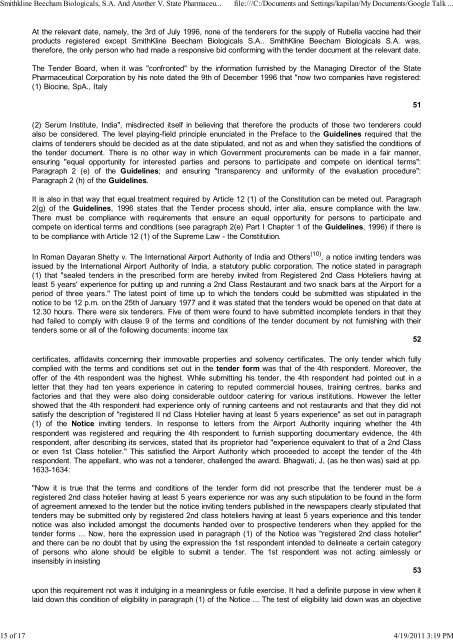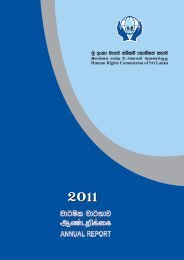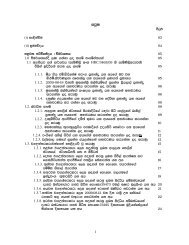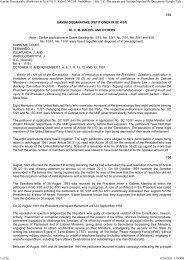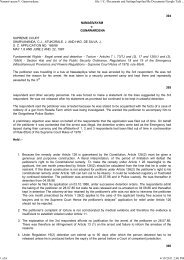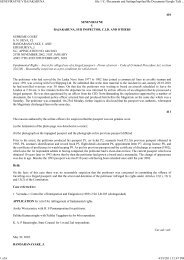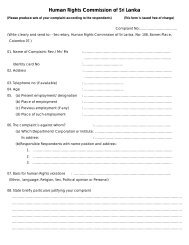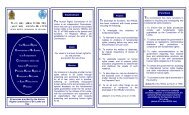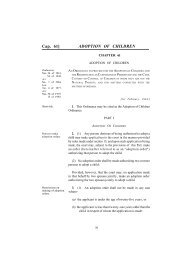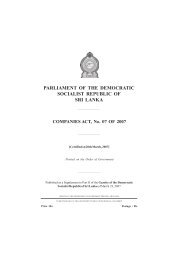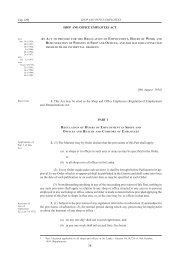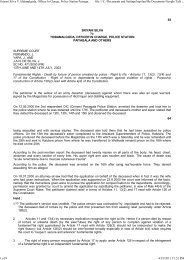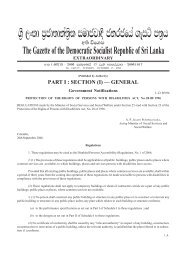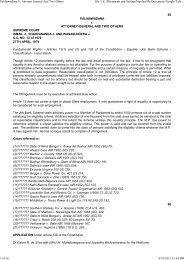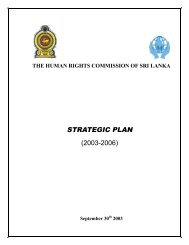Smithkline Beecham Biologic... - Human Rights Commission of Sri ...
Smithkline Beecham Biologic... - Human Rights Commission of Sri ...
Smithkline Beecham Biologic... - Human Rights Commission of Sri ...
You also want an ePaper? Increase the reach of your titles
YUMPU automatically turns print PDFs into web optimized ePapers that Google loves.
<strong>Smithkline</strong> <strong>Beecham</strong> <strong>Biologic</strong>als, S.A. And Another V. State Pharmaceu... file:///C:/Documents and Settings/kapilan/My Documents/Google Talk ...<br />
At the relevant date, namely, the 3rd <strong>of</strong> July 1996, none <strong>of</strong> the tenderers for the supply <strong>of</strong> Rubella vaccine had their<br />
products registered except SmithKline <strong>Beecham</strong> <strong>Biologic</strong>als S.A.. SmithKline <strong>Beecham</strong> <strong>Biologic</strong>als S.A. was,<br />
therefore, the only person who had made a responsive bid conforming with the tender document at the relevant date.<br />
The Tender Board, when it was "confronted" by the information furnished by the Managing Director <strong>of</strong> the State<br />
Pharmaceutical Corporation by his note dated the 9th <strong>of</strong> December 1996 that "now two companies have registered:<br />
(1) Biocine, SpA., Italy<br />
(2) Serum Institute, India", misdirected itself in believing that therefore the products <strong>of</strong> those two tenderers could<br />
also be considered. The level playing-field principle enunciated in the Preface to the Guidelines required that the<br />
claims <strong>of</strong> tenderers should be decided as at the date stipulated, and not as and when they satisfied the conditions <strong>of</strong><br />
the tender document. There is no other way in which Government procurements can be made in a fair manner,<br />
ensuring "equal opportunity for interested parties and persons to participate and compete on identical terms":<br />
Paragraph 2 (e) <strong>of</strong> the Guidelines; and ensuring "transparency and uniformity <strong>of</strong> the evaluation procedure":<br />
Paragraph 2 (h) <strong>of</strong> the Guidelines.<br />
It is also in that way that equal treatment required by Article 12 (1) <strong>of</strong> the Constitution can be meted out. Paragraph<br />
2(g) <strong>of</strong> the Guidelines, 1996 states that the Tender process should, inter alia, ensure compliance with the law.<br />
There must be compliance with requirements that ensure an equal opportunity for persons to participate and<br />
compete on identical terms and conditions (see paragraph 2(e) Part I Chapter 1 <strong>of</strong> the Guidelines, 1996) if there is<br />
to be compliance with Article 12 (1) <strong>of</strong> the Supreme Law - the Constitution.<br />
In Roman Dayaran Shetty v. The International Airport Authority <strong>of</strong> India and Others (10) , a notice inviting tenders was<br />
issued by the International Airport Authority <strong>of</strong> India, a statutory public corporation. The notice stated in paragraph<br />
(1) that "sealed tenders in the prescribed form are hereby invited from Registered 2nd Class Hoteliers having at<br />
least 5 years' experience for putting up and running a 2nd Class Restaurant and two snack bars at the Airport for a<br />
period <strong>of</strong> three years." The latest point <strong>of</strong> time up to which the tenders could be submitted was stipulated in the<br />
notice to be 12 p.m. on the 25th <strong>of</strong> January 1977 and it was stated that the tenders would be opened on that date at<br />
12.30 hours. There were six tenderers. Five <strong>of</strong> them were found to have submitted incomplete tenders in that they<br />
had failed to comply with clause 9 <strong>of</strong> the terms and conditions <strong>of</strong> the tender document by not furnishing with their<br />
tenders some or all <strong>of</strong> the following documents: income tax<br />
52<br />
certificates, affidavits concerning their immovable properties and solvency certificates. The only tender which fully<br />
complied with the terms and conditions set out in the tender form was that <strong>of</strong> the 4th respondent. Moreover, the<br />
<strong>of</strong>fer <strong>of</strong> the 4th respondent was the highest. While submitting his tender, the 4th respondent had pointed out in a<br />
letter that they had ten years experience in catering to reputed commercial houses, training centres, banks and<br />
factories and that they were also doing considerable outdoor catering for various institutions. However the letter<br />
showed that the 4th respondent had experience only <strong>of</strong> running canteens and not restaurants and that they did not<br />
satisfy the description <strong>of</strong> "registered II nd Class Hotelier having at least 5 years experience" as set out in paragraph<br />
(1) <strong>of</strong> the Notice inviting tenders. In response to letters from the Airport Authority inquiring whether the 4th<br />
respondent was registered and requiring the 4th respondent to furnish supporting documentary evidence, the 4th<br />
respondent, after describing its services, stated that its proprietor had "experience equivalent to that <strong>of</strong> a 2nd Class<br />
or even 1st Class hotelier." This satisfied the Airport Authority which proceeded to accept the tender <strong>of</strong> the 4th<br />
respondent. The appellant, who was not a tenderer, challenged the award. Bhagwati, J, (as he then was) said at pp.<br />
1633-1634:<br />
"Now it is true that the terms and conditions <strong>of</strong> the tender form did not prescribe that the tenderer must be a<br />
registered 2nd class hotelier having at least 5 years experience nor was any such stipulation to be found in the form<br />
<strong>of</strong> agreement annexed to the tender but the notice inviting tenders published in the newspapers clearly stipulated that<br />
tenders may be submitted only by registered 2nd class hoteliers having at least 5 years experience and this tender<br />
notice was also included amongst the documents handed over to prospective tenderers when they applied for the<br />
tender forms ... Now, here the expression used in paragraph (1) <strong>of</strong> the Notice was "registered 2nd class hotelier"<br />
and there can be no doubt that by using the expression the 1st respondent intended to delineate a certain category<br />
<strong>of</strong> persons who alone should be eligible to submit a tender. The 1st respondent was not acting aimlessly or<br />
insensibly in insisting<br />
53<br />
upon this requirement not was it indulging in a meaningless or futile exercise. It had a definite purpose in view when it<br />
laid down this condition <strong>of</strong> eligibility in paragraph (1) <strong>of</strong> the Notice ... The test <strong>of</strong> eligibility laid down was an objective<br />
15 <strong>of</strong> 17 4/19/2011 3:19 PM<br />
51


